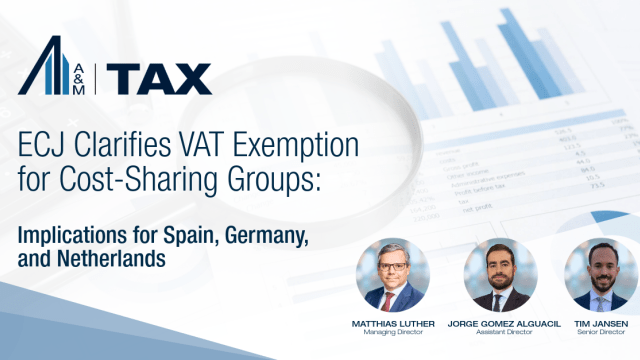IRS Issues Guidance on Section 162(m) $1 million Compensation Deduction Limitation
On August 21, 2018, the IRS issued Notice 2018-68, which provides some much-anticipated guidance on the application of amendments to section 162(m) of the Internal Revenue Code (Section 162(m)). Section 162(m) provides that compensation exceeding $1 million paid to certain “covered employees” of a publicly held corporation is nondeductible by the corporation.
Under prior law, compensation that was “performance-based” was not subject to the $1 million limitation. Additionally, the definition of “covered employee” excluded a corporation’s Chief Financial Officer (CFO). Finally, covered employees were identified at the end of each calendar year—independently of prior calendar years.
The 2017 Tax Cuts and Jobs Act (TCJA) modified Section 162(m) in several significant respects. First, it expanded the definition of “publicly held corporation” to include entities that would not have previously been subject to Section 162(m). Second, it expanded the definition of “covered employee” to include a corporation’s CFO. Additionally, covered employees now include any individual who would be a covered employee at any time during the current year, as well as anyone who was a covered employee in any prior year. Finally, the TCJA eliminated the “performance-based” compensation exception, so that the deduction limitation is now applied to all compensation exceeding $1 million, regardless of how it is classified.
The TCJA provided some transition relief for the amendments to Section 162(m). Generally, the amendments to Section 162(m) apply to taxable years beginning after December 31, 2017. However, the TCJA also provides that the amendments will not apply to compensation that is payable pursuant to a written binding contract in effect as of November 2, 2017, that is not materially modified after that date. The breadth and scope of this “grandfather rule” has been the subject of much debate. Notice 2018-68 answers many questions surrounding this grandfathering rule and brings some certainty to this area of the tax law. This article will address a few of these issues at length.
- Covered Employees Expanded
Section 162(m) provides that the definition of covered employee includes any employee who served as the Chief Executive Officer (CEO) or CFO of a publicly held corporation at any time during the year, as well as any employee whose total compensation is required to be disclosed to shareholders under SEC rules because he or she is among the three next most highly compensated officers. Although the SEC rules generally require that compensation be reported for executive officers serving at the end of a calendar year, the IRS clarifies that the end-of-year requirement does not apply for purposes of Section 162(m). Thus, the term “covered employee” includes, in addition to someone who served as CEO or CFO at any time during the year, any employee who is among the next three highest paid executive officers for the taxable year, regardless of whether they are serving in such capacity at the end of such year, and regardless of whether the SEC rules would require disclosure of their compensation for the year.
- Grandfathering Rules
The grandfathering rule in the statute provides that the amendments to Section 162(m) do not apply to payments that applicable law obligates the corporation to pay under a written binding contract that was in effect as of November 2, 2017. The application of this rule has been the subject of much debate.
- Payments Subject to Negative Discretion
Any amount payable to a covered employee that is subject to negative discretion (for example, a performance-based bonus that is subject to reduction or elimination at the discretion of the Compensation Committee) will not qualify for the grandfather status of Section 162(m). Thus, any payment made to a covered employee that is subject to negative discretion will be subject to the $1 million limitation, regardless of when the agreement giving rise to the payment was entered into. Thus, annual bonuses earned in 2017 and paid in 2018 that are subject to the exercise of negative discretion generally would be subject to the limitation, even if the bonus plan was in place prior to enactment of the TCJA or the bonus was calculated based upon fixed, objective performance criteria.
- Pre-existing CFO Employment Agreements
Because CFOs were not previously covered employees, many questions arose regarding the treatment of amounts payable to a CFO pursuant to an employment agreement that was in effect as of November 2, 2017. The guidance generally provides that amounts payable under such agreements will be grandfathered. Thus, for example, salary payable to a CFO who was guaranteed a $2 million salary annually through December 31, 2020, pursuant to a written binding employment agreement that was in effect as of November 2, 2017, will be fully deductible, provided the agreement is not materially modified in the interim. The IRS has indicated that cost-of-living increases would generally not be considered a material modification—so that the original $2 million would still be fully deductible. (Note that the additional amount payable pursuant to the cost of living increase, however, would be subject to the new rules and therefore be nondeductible). However, any increase in compensation beyond a cost of living increase would be treated as a material modification of the entire agreement, resulting in loss of grandfathered status for all amounts payable under the agreement after the date of such modification (including the $2 million payable under the original agreement prior to the modification).
- Automatic Renewal Provisions
The IRS has indicated that to the extent an agreement is subject to automatic renewal each year, provided that notice to terminate is not given within some period prior to the end of any year, the agreement will be treated as renewed as of the beginning of any such extended year and will, therefore, lose grandfathered status. However, if the corporation may remain legally bound to the contract beyond a certain date at the sole discretion of the employee, the contract will not be treated as renewed due to the employee’s exercise of his or her discretion to not terminate the contract.
- Prior Compensation Deferrals
The IRS clarifies that if an employee made an election to defer any amount under a deferred compensation plan, which is payable in a subsequent calendar year, then to the extent such employee was not a covered employee at the time the deferral election was made, the amounts payable pursuant to such plan and election will not be subject to the new rules, even if the employee becomes a covered employee prior to the date of the payment. However, the new Section 162(m) rules will apply if the individual was a covered employee at the time the deferral election was made (even if the election was made prior to November 2, 2017).
- Prior Performance-Based Equity Awards
The IRS also clarifies that to the extent an equity award was issued prior to November 2, 2017, then to the extent such award would have been treated as performance-based compensation under the old rules (e.g., SARs or stock options), such award will continue to be subject to the old rules (and be eligible for the performance-based exception), provided that it is not subject to reduction by the application of negative discretion.
- Benefit Plan Participation
The IRS also stated in Notice 2018-68 that grandfathering may apply to participation in a plan or arrangement, even if the individual was not eligible for the plan or arrangement as of November 2, 2017. As an example, Notice 2018-68 describes an individual who entered into a contract with a publicly held corporation, effective as of October 2, 2017, to serve as its CFO. The agreement provided that the employee would be eligible to participate in the company’s deferred compensation plan effective as of April 1, 2018, and that as of that date, the CFO’s benefit would be $3 million. In this example, the $3 million was not subject to the $1 million compensation deduction limitation, even though the CFO was not eligible to participate in the plan until April 1, 2018. That is because (i) the individual was not a covered employee at the time the contract was entered into, and (ii) the benefit was provided to the individual pursuant to the terms of a written binding contract in effect as of November 2, 2017. While the grandfathering provision highlighted in this particular example may not be broadly applicable, it could be helpful in certain circumstances.
Alvarez & Marsal Taxand Says:
IRS Notice 2018-68 brings some certainty to the grandfathering provisions of Section 162(m) as modified by the TCJA. However, application of the grandfathering provisions can still involve a complicated analysis. The compensation and benefits professionals at Alvarez and Marsal are uniquely qualified to assist when determining the extent to which arrangements in effect at the time the TCJA was enacted may continue to qualify for exemption from the deduction limitation of Section 162(m).






